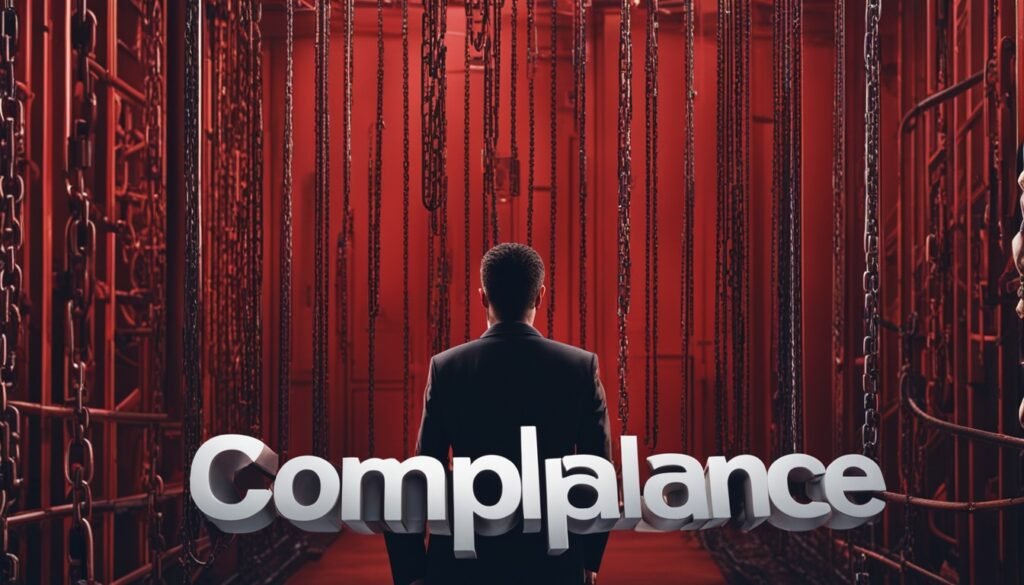Cybersecurity for Small and Medium Enterprises in Ireland
Did you know over 7,300 people work in the cybersecurity field in Ireland? They work in about 500 companies. Together, they generate €1.1 billion for the economy every year. However, small and medium companies (SMEs) in Ireland are still very much at risk from cyber threats. With more cyber incidents happening, it’s crucial for SMEs to boost their cybersecurity. This will help them keep their data safe and their business strong.
The world becoming more digital has made SMEs a bigger target for cyberattacks. Because they often have weaker security and smaller budgets, they face risks like financial loss and damage to their reputation. Irish SMEs need to make protecting their digital space a top priority. Doing so will make them stronger against online threats.
Key Takeaways
- The Irish cybersecurity sector employs over 7,300 professionals and contributes €1.1 billion annually to the economy.
- There has been a sharp increase in demand for cybersecurity skills, with job roles tripling from 2019 to 2022.
- SMEs are highly vulnerable due to limited investment in cybersecurity measures.
- Increased cyberattacks can lead to significant financial and reputational damage for SMEs.
- Enhancing cybersecurity infrastructure is critical to building robust cyber resilience for Irish SMEs.
Introduction to Cybersecurity Challenges for SMEs
The digital world is changing fast, putting small and medium-sized businesses (SMEs) at high risk for cyber threats. In Ireland, SMEs make up 99% of all companies and give over half of the EU’s GDP. But, they are not safe from data breach risks and cyber threats, which are getting more advanced every day.
Almost half of SMEs hit by a major cyber attack can close within several months. Ransomware is a big problem now, and the costs of handling it can be too much for an SME. The dangers are real, making cybersecurity investment a key point for staying in business.
Many SMEs deal with sensitive financial and personal data but don’t have enough security in place. One big reason is that in Ireland, cybersecurity training focuses on making people professionals, not helping business owners protect their companies. This leaves many SMEs without the tools to face data breach risks.
About 43% of all cyber-attacks aim at small companies. Last year, 32% of UK companies said they were attacked or had a breach. These numbers mean SMEs need to act quickly to make their cybersecurity stronger.
Investing in cybersecurity education is crucial. The Certificate in Cybersecurity for Business, from Irish schools, is a great step. It’s made for SME owners, with classes online and use of advanced cybersecurity tools, such as the Cyber Range from Cyber Skills.
The cybersecurity sector in Ireland is growing, with about 7,300 experts spread among 489 companies. This rise shows the vital need for every SME to take investment in cybersecurity serious. It’s a must for protecting digital assets and keeping business running in the digital era.
Importance of Data Protection
In today’s digital world, keeping data safe is top priority. This is crucial for keeping customers’ trust and making sure business runs smoothly. Shockingly, about one in five Irish companies faced a cyberattack or data breach last year. Still, more than a quarter of business leaders in Ireland are not ready to spend more on security.
Small and medium-sized Irish companies are often targeted because they might seem easier to hit. They also handle valuable, sensitive info. The problem gets worse because these companies usually don’t invest enough in protecting their data. Most cyberattacks happen because someone made a mistake, proving the need for better data protection and education for employees.
Using strong, unique passwords and two-factor authentication can help stop many risks. Also, keeping backup copies of important data is key to survive a ransomware attack. But in 2022, cybercrimes cost the Irish economy €10 billion. This shows the huge financial reasons to amp up security.
Cases of economic crime and fraud in Ireland have jumped, with more than 70% of businesses hit by cyberattacks. It’s clear that protecting sensitive info and getting cyber insurance is essential to control costs.
More money is being put into cybersecurity solutions and services. Ireland’s cybersecurity market is now worth $300 million. Big data breaches often hit the news, pushing everyone to take serious steps in protecting data. This is crucial to retain customer trust and avoid breaches.
Understanding Network Security for Irish SMEs
Network security is key for an SME’s cybersecurity posture. With almost all Irish businesses being SMEs, protecting cyber assets is crucial. As SMEs create most jobs, strong network security is vital.
The Covid-19 pandemic has made digital vulnerabilities worse. By 2025, most significant cyber incidents will be due to people’s actions. These include social attacks and misuse, making strong network security essential.
In Ireland, cybercrime cost €630 million in 2022, with 82% of businesses hacked. A big ransomware attack in 2023 cost the Health Service Executive €100 million. These events stress the need for Irish SMEs to improve network security.
Worldwide, a cyber attack happens almost every 11 seconds. This shows SMEs must improve their cybersecurity posture. Yet, under a third of Irish businesses have a proper cyber response plan, even though remote work increases threats.
‘Zero trust’ architecture, familiar to 91% of organizations, can boost security. It aims to end blind trust and check digital actions step by step. This strategy builds stronger cyber resiliency.
To secure networks, regular risk tests are needed. About half of businesses have upped their risk testing. The path to preventing threats starts with these efforts. The Dell GDPI survey shows more companies are adopting these strategies too.
In Ireland, more leaders see the need to invest in network security. Nearly half plan to spend more on cyber controls. But, 11% face resource challenges. Finding a way past these issues is important to avoid big cyber attack damages.
With cyber threats rising, Irish SMEs must make network security a top priority. Taking proactive steps will protect the economy and jobs they help create.
Risk Management Strategies for Small Businesses
As cyber threats keep growing, small and medium-sized enterprises (SMEs) must act. They need effective cyber risk management strategies. These can help a lot, even with their often limited resources. A strong security strategy can cut down on risks big time.
Updating software and managing patches is vital for cyber risk management. This keeps systems less vulnerable to harmful attacks. Also, having cyber insurance protects SMEs financially from big cyber problems.
Training employees is key for a solid SME security plan. They need to know about phishing and ransomware. Educating workers creates a culture where everyone is alert to potential cyber dangers. This makes it easier for them to spot and deal with threats fast.
In Ireland, the National Cyber Security Strategy is improving safety for all, including SMEs. The strategy is under a microscope, making sure it’s up to date. This is to fill in any gaps and help it work better for SMEs.
Setting up an internal control system is also crucial. It boosts operations by making information easier to access. It stops bad actions. This is super essential as many UK businesses have faced cyberattacks. A tailored cyber risk plan can help avoid such issues.
Finding a good balance between cost and effectiveness is key in creating a security plan. The money spent on cybersecurity initially is worth it. It helps avoid loss in the long run, like downtime and expensive fines for breaches.
Here’s a look at some risk management tactics for SMEs:
| Strategy | Benefits | Challenges |
|---|---|---|
| Regular Updates and Patch Management | Reduces vulnerabilities, easy to implement | Requires consistent monitoring |
| Employee Training | Fosters a culture of security awareness | Ongoing process, requires regular updates |
| Cyber Insurance | Provides financial protection | Can be costly for small businesses |
| Internal Control Systems | Improves operational efficiency | Complex to establish and maintain |
Using these tactics can really strengthen an SME’s defense against cyber threats. Making cyber risk management and SME security strategy part of the daily work helps small businesses stay safe.
Identifying and Mitigating Cyber Threats
Today, small and medium businesses face many online dangers. These can mess with their data and work. Figuring out and using strong methods to stop these threats can help a lot. This key understanding will be a big focus at the “Evolve – Cyber Security Awareness for SME’s” conference soon.
Common Types of Cyber Threats
The online threats keep changing, which means SMEs need to always be on guard. Let’s look at some threats they’re dealing with:
- Phishing Attacks: These are sneaky emails or messages. They’re out to get employees to share secret info.
- Ransomware: It’s a bad software. It hides your data until you pay a ransom to get it back.
- SQL Injection: This one targets websites with databases. It lets bad guys run their own database commands.
- Brute Force Attacks: Here, attackers try lots of password combos to get into accounts.
- Trojan Horses: They’re hidden in what looks like regular software. But they let attackers get in through the back.
Best Practices for Threat Prevention
Having strong online defenses is a must to lower the risk of being attacked. Let’s check out some tips for solid threat prevention:
- Regular Software Updates: Keep everything up to date. This shields against known weak spots.
- Two-Factor Authentication (2FA): It makes logins tougher for bad actors. They have to pass two checks instead of one.
- Cyber Insurance: It helps cover the costs if a cyber attack happens.
- Employee Training: Teach your team often about spotting and dealing with online threats.
- Network Security: Use firewalls and other tools to stop unauthorized access on your network.
The conference at the Iontas Centre in Castleblayney, Co. Monaghan, on April 26, 2024, is a great chance for SMEs to amp up their cyber defenses. It’s all about learning and making connections. Puneet Kukreja and other experts will lead the discussion, helping businesses lower their online risk.
Conducting Vulnerability Assessments
Conducting vulnerability assessments is key to improving IT security for Small and Medium Enterprises (SMEs) in Ireland. About 43% of all cyber-attacks target small businesses. So, it’s vital to find and fix any security weaknesses. These tests help find flaws in a company’s IT systems, making them stronger against attacks.
The number of security breaches in SMEs jumped by 152% from 2020 to 2021. Since cyber-attacks are getting more common, businesses need to check for vulnerabilities. This way, issues can be fixed before hackers strike.
More than 70% of assessments aim to find unknown security issues in an SME’s network. They look at different parts like endpoint health and user accounts to spot weaknesses.
- Endpoint health
- User accounts
- Dark web exposure
Guidelines such as Cyber Essentials and Cyber Essentials Plus help address these vulnerabilities. Cyber Essentials focuses on five key security areas. Cyber Essentials Plus goes further by checking these areas with a technical audit, making sure the security is strong.
Penetration testing is also key to these assessments. This testing helps find weaknesses in security before hackers do. Companies like Fortinet recommend this proactive testing because their security solutions are trusted by many SMEs.
Next, vulnerability management is crucial for ongoing protection. It means regularly checking for new security threats. By automating these checks, businesses can find and fix issues quickly, preventing potential harm.
Lastly, the reports from these tests show what SMEs must work on to improve their security. They offer details about current risks and suggest how to reduce these threats.
Incident Response Planning for SMEs
Nowadays, small and medium-sized enterprises (SMEs) are facing more cyber threats than ever. It is crucial for them to have a strong response plan. This plan will help them deal with and recover from cyber incidents. It also ensures they manage potential fallout well.
Steps to Develop an Effective Incident Response Plan
Developing a solid incident response plan requires specific steps. SMEs must be ready to identify, report, and deal with cyber incidents. This includes steps to assess, contain, investigate, and recover from these threats.
- Identify: Recognize potential threats and vulnerabilities.
- Report: Establish a clear protocol for reporting incidents.
- Triaging: Prioritize incidents based on severity and impact.
- Assess: Evaluate the scope and damage of the incident.
- Contain: Implement measures to limit the spread of the incident.
- Eradicate: Remove the threat from the system.
- Investigate: Conduct a thorough investigation to understand the root cause.
- Recover: Restore systems and operations to normal.
Importance of Immediate Action
When it comes to cyber incidents, acting fast is key. It helps to reduce harm and recover quicker. Keeping the response plan up to date ensures it works well. Sometimes, getting help from experts, such as incident response firms, can make recovery faster.
Since cyber threats change quickly, it’s vital to regularly update the response plan. A recent report found that cyber breaches are getting more costly for businesses in the UK. This makes it even more urgent for SMEs to be on top of their cybersecurity planning.
| Indicators | Statistics |
|---|---|
| UK Businesses Affected by Cyber-attacks | 39% |
| Frequency of Cyber Breaches/Attacks (Monthly or More Often) | 49% |
| Solvency at Risk Due to Cyber-attacks | 21% |
| Security Events Responded by Kroll Annually | 3,000+ |
The rise in cyber-attacks is hitting small businesses hard. In Dublin, SMEs face a unique challenge because of their limited cybersecurity measures. They can improve by using strong encryption, running security checks often, and joining cybersecurity events.
Compliance Regulations for Cybersecurity
For small and medium-sized businesses (SMEs) in Ireland, following cybersecurity rules is very important. This is especially true with data breaches becoming more expensive. They cost an average of $4.45 million worldwide in 2023, up 15% in the last three years alone.

GDPR, known as the toughest privacy and security law worldwide, can give hefty fines for breaking the rules. These fines could go as high as €20 million or 4% of a company’s yearly revenue. The threat of such big fines really stresses how crucial it is to have strong compliance steps in place.
Falling in line with cyber rules like GDPR helps companies keep their important info safe. It ensures they report breaches as soon as needed. However, it takes about 77 days to spot and report a breach. This highlights the need for quick and effective compliance steps.
Government and different groups have put out laws and directives to help businesses do better against cyber threats. For example, they’ve made the NIS2 directive and the Digital Services Act (DSA). These are all about improving cyber strength and stopping illegal internet activities.
The scene has been set by the Digital Operational Resilience Act (DORA) too. It covers how to handle incidents, test strength, and manage risks from third parties for financial companies. Following these rules helps create a good plan for handling cybersecurity. This way, companies can meet their obligations.
- GDPR Fines: Up to €20 million or 4% of annual revenue
- Breach Notification: Average identification and contact time is 77 days
- NIS2 Directive: Enhanced cyber resilience for medium and large-sized organizations
- DSA: Prevents illegal online activities
- DORA: Incident management and resilience testing for financial entities
As cyber threats change, sticking to the rules is still critical. A survey by BT showed that about 61% of companies find it hard to keep up with new cybersecurity steps. This shows that meeting these challenges is a constant effort.
The Role of Employee Training in Cybersecurity
Employee training is key to boosting cybersecurity in SMEs. Ireland saw a 22% rise in cyber attacks. 40% of Dublin’s users were hit by phishing. It’s urgent to teach staff about these dangers. This training helps them spot and tackle threats, making the whole firm safer.
Essential Training Topics
There are key topics for cybersecurity training:
- Phishing Awareness: Because 40% of Dublin’s users fell for phishing, knowing how to spot and report it is vital.
- Ransomware Prevention: With 25% of SMEs in Dublin facing this issue, understanding and preventing ransomware is crucial.
- Proper Use of Security Tools: Knowing how to use antivirus and firewalls, critical for many firms in Dublin, keeps threats at bay.
- Incident Response Protocols: Having a plan for when cybersecurity incidents occur can limit their impact significantly.
Building a Culture of Security Awareness
Creating a safe work culture goes beyond just training. It’s teaching everyone to see cybersecurity as their concern, always:
- Regular Updates: Learning about new threats and ways to prevent them keeps everyone sharp.
- Interactive Sessions: Workshops and simulations are a great way to understand the dangers out there.
- Management Involvement: Good example from leaders shows how important cybersecurity is for the whole team.
- Feedback Mechanisms: Easy reporting and feedback on security habits help build trust and quick response to dangers.
By fostering a culture of security, every part of the organization picks up the mission of fighting cyber threats together.
Secure Cloud Computing for Irish SMEs
Cloud computing is changing how Irish SMEs work. 76% of them use cloud services daily. The perks include scalable tools and saving money which are hard to ignore. But to make the most of it, focusing on keeping data safe is crucial.
Irish SMEs can pick from several cloud storage options. Google Workspace is top, with 40% of the market.
Microsoft OneDrive for Business follows close at 35%. For 15% of SMEs, Dropbox Business is their go-to. Box and Amazon Web Services (AWS) S3 serve smaller groups at 5% and 4%. A lesser-known choice, iDrive, offers affordability, capturing 1%.
| Cloud Storage Solution | Market Share in Irish SMEs |
|---|---|
| Google Workspace | 40% |
| Microsoft OneDrive for Business | 35% |
| Dropbox Business | 15% |
| Box | 5% |
| AWS S3 | 4% |
| iDrive | 1% |
Keeping cloud data safe is crucial. A data breach could hurt an SME’s image and finances. Therefore, strong security solutions are a must. Zirona IT & Cybersecurity has helped 100+ Irish SMEs with secure cloud storage. They’ve seen a 95% satisfaction rate for security and efficiency.
It’s also important for SMEs to note the rise of AI and machine learning in the cloud. These technologies help streamline tasks and improve accuracy. At the same time, Ireland’s focus on cybersecurity, like the National Cyber Security Strategy, is making the digital world safer.
Irish SMEs’ trust in cloud computing shows the need for secure storage. It also shows how they’re embracing advanced yet cost-effective tech. By following good cloud practices, SMEs can succeed in the digital era, protecting their data and operations.
Why Cybersecurity for Small and Medium Enterprises in Ireland Is Essential
In Ireland, small and medium enterprises (SMEs) are vital to the economy’s success. They host about 30% of the EU’s data. This makes Ireland a key player in the digital world. But, SMEs can suffer more from cyberattacks than big companies because they have fewer resources.
Consequences of Ignoring Cybersecurity
Not focusing on cybersecurity can cause huge problems for SMEs. For instance, cybercrimes cost Ireland €9.6 billion. Unfortunately, one in three Irish SMEs was hit by cybercrime from May 2021 to April 2022. The average loss was €22,773.
After an attack, businesses might lose data, money, and trust from customers. It’s clear that working to improve cybersecurity is crucial. Professor Donna O’Shea notes that a cyberattack might even force a business to close. This shows just how important building cyber resilience is for the survival of an SME.
Steps to Enhance Cyber Resilience
Enhancing cyber resilience involves a complete strategy that covers policy, tech, and culture:
- Invest in Cybersecurity Education: Ireland’s CYBER-SKILLS initiative helps close the cybersecurity skills gap. It offers flexible, job-focused university courses. Businesses like Dell and Mastercard help by providing cybersecurity training for employees.
- Adopt the National Cyber Security Strategy: This strategy improves how we respond to cyber threats. It also protects key parts of the country’s digital infrastructure, grows careers in cybersecurity, and educates businesses about cyber threats.
- Foster Private-Public Partnerships: Working together, businesses and the government better tackle cybersecurity challenges. Sharing information and resources helps both sectors stay secure.
- Implement Proactive Cybersecurity Practices: Regularly testing and updating risk measures, and investing more in cyber protection, help SMEs be ready for cyber threats.
A strong cybersecurity plan not only protects against attacks but also supports a business’s competitive position. Taking these proactive steps can lower the impact of a cyberattack on SMEs. It helps them be more resilient and ready for the future.
Conclusion
We’ve covered a lot about how Irish SMEs can up their cybersecurity game. It’s critical for these small and medium-sized businesses to have strong digital defenses. They are vital for Ireland’s economy and must be shielded from online threats.
With almost 500 companies, Ireland’s cybersecurity sector is rich and diverse. It blends innovation with deep technical knowledge, showing a true dedication to cybersecurity. This mix is key for protecting SMEs and their digital assets.
Today, lots of Irish cybersecurity firms are pure players, solely focused on cybersecurity. And, about half are home-grown, showing Ireland has lots of skilled people ready to fight digital threats. In total, over 7,000 experts are helping to keep SMEs safe.
Ireland has also taken big steps to improve in cybersecurity, reducing the skills gap by 19.5%. This success is a sign of Ireland’s commitment to a safer digital world. At events like the Enterprise Ireland Cyber Summit, Irish and North American companies work together to improve.
SMEs can protect themselves by taking quick action, training their staff, and following laws. Using secure tech and boosting security awareness are also key steps. With these actions, Irish SMEs can be strong in the digital world and help the economy grow safely.
Source Links
- Cyber Ireland unveils ambitious roadmap to drive Cyber Security sector growth by 2030
- Cyber Ireland 4 Pillars: A Cyber Security Baseline Framework for SME’s – Cyber Ireland
- SMEs must play a role in devising Ireland’s Cybersecurity Strategy – Digital Business Ireland – Digital Business Ireland
- New cyber security certificate offers SMEs a pathway to greater business resilience and online savviness
- The threats cyber criminals pose to SMEs | NFP
- Are SMEs paving the way for cyber attacks on larger companies?
- No title found
- Ireland – Cybersecurity
- The Essential Guide to Cybersecurity for SMEs
- Cyber security 101 for Irish businesses – TechCentral.ie
- Cybersecurity for Businesses in Dublin, Ireland: Essential Strategies
- Cyber-security remains a priority for Irish businesses, with almost half likely to increase investment in risk mitigation
- Risk-Management Framework and Information-Security Systems for Small and Medium Enterprises (SMEs): A Meta-Analysis Approach
- Cyber security for small and medium-sized businesses | Guide to loss prevention | UK & Ireland | HSB
- Evolve – Cyber Security Awareness for SME’s Conference – Local Enterprise Office
- Cybersecurity Policy
- Cyber Security – inTEC Business Ireland
- Cybersecurity for small businesses
- Vulnerability Testing | ZettaBytes
- No title found
- Cyber Incident Response for Small Businesses | Redscan
- Cybersecurity for Small Businesses in Dublin
- Cybersecurity Threat Detection in Dublin, Ireland: Tools and Techniques
- Exploration of the Impact of Cybersecurity Awareness on Small and Medium Enterprises (SMEs) in Wales Using Intelligent Software to Combat Cybercrime
- Top Cloud Storage Solutions for Irish SMEs | Zirona IT Support
- Tech-Driven Progress: How Ireland’s Small Businesses Are Leveraging Tech Trends in 2024 — GBTECH
- My Top 5 Technology Must haves for an Irish SME in 2023
- Focus on Ireland’s National Cyber Strategy – PrivacySolved
- Boosting cybersecurity skills for small businesses in Ireland
- Cybersecurity in Ireland: A Thriving Industry with Global Impact – Barden
- Insights into European (and Irish) Private Cybersecurity Investment – Cyber Ireland
- Enterprise Ireland: Irish cybersecurity are firms making a big global impression








